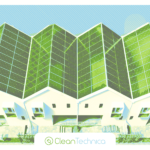Introduction
Energy efficiency and renewable energy are two critical components of the global effort to reduce greenhouse gas emissions and mitigate the effects of climate change. While both approaches have their own benefits and drawbacks, it’s essential to understand the differences between them and determine which one is most effective. In this article, we’ll delve into the world of energy efficiency and renewable energy, exploring their definitions, benefits, and challenges.
Energy Efficiency
What is Energy Efficiency?
Energy efficiency refers to the use of less energy to achieve the same level of energy output. This can be achieved through various means, including:
* Improving building insulation and reducing heat loss
* Installing energy-efficient appliances and lighting
* Implementing smart grid systems to optimize energy distribution
* Encouraging behavior change through education and incentives
Benefits of Energy Efficiency
The benefits of energy efficiency are numerous, including:
* Reduced energy consumption: By using less energy, we can decrease our reliance on fossil fuels and lower our carbon footprint.
* Cost savings: Energy-efficient technologies and practices can help reduce energy costs for individuals and businesses.
* Job creation: The energy efficiency industry is growing rapidly, creating new job opportunities in manufacturing, installation, and maintenance.
* Improved energy security: By reducing our reliance on foreign oil and increasing domestic energy production, we can improve our energy security.
Challenges of Energy Efficiency
While energy efficiency offers many benefits, there are also some challenges to consider:
* High upfront costs: Implementing energy-efficient technologies and practices can be expensive, making it challenging for some individuals and businesses to adopt.
* Behavioral change: Encouraging individuals to change their energy-using behaviors can be difficult, especially if they are not aware of the benefits.
* Limited scalability: Energy efficiency measures may not be suitable for all industries or applications, limiting their scalability.
Renewable Energy
What is Renewable Energy?
Renewable energy refers to energy generated from natural sources that are sustainable and cannot be depleted, such as:
* Solar energy: Energy generated from the sun’s rays
* Wind energy: Energy generated from wind
* Hydro energy: Energy generated from the movement of water
* Geothermal energy: Energy generated from the heat of the Earth
Benefits of Renewable Energy
The benefits of renewable energy are numerous, including:
* Zero greenhouse gas emissions: Renewable energy sources do not emit greenhouse gases, making them a crucial component in the fight against climate change.
* Energy independence: Renewable energy can be generated locally, reducing our reliance on foreign oil and improving energy security.
* Job creation: The renewable energy industry is growing rapidly, creating new job opportunities in manufacturing, installation, and maintenance.
* Improved public health: Renewable energy can reduce air pollution, improving public health and quality of life.
Challenges of Renewable Energy
While renewable energy offers many benefits, there are also some challenges to consider:
* Intermittency: Renewable energy sources like solar and wind are intermittent, meaning they are not always available when they are needed.
* High upfront costs: Installing renewable energy technologies can be expensive, making it challenging for some individuals and businesses to adopt.
* Infrastructure: Widespread adoption of renewable energy requires significant infrastructure investments, including transmission lines and energy storage facilities.
Comparison of Energy Efficiency and Renewable Energy
Which is More Effective?
Both energy efficiency and renewable energy are critical components of a comprehensive energy strategy. However, when it comes to addressing climate change, renewable energy may be more effective.
* Renewable energy can help reduce greenhouse gas emissions, while energy efficiency can only reduce energy consumption.
* Renewable energy can provide a direct substitute for fossil fuels, while energy efficiency may not be able to achieve the same level of impact.
Conclusion
Energy efficiency and renewable energy are both essential components of our efforts to reduce greenhouse gas emissions and mitigate the effects of climate change. While energy efficiency can help reduce energy consumption and costs, renewable energy can provide a direct substitute for fossil fuels and help reduce our carbon footprint. By combining energy efficiency and renewable energy, we can create a more sustainable and resilient energy future.
FAQs
Q: What is the most effective way to reduce greenhouse gas emissions?
A: The most effective way to reduce greenhouse gas emissions is to transition to renewable energy sources and improve energy efficiency.
Q: Can energy efficiency reduce greenhouse gas emissions?
A: Yes, energy efficiency can reduce greenhouse gas emissions by reducing energy consumption.
Q: What are the benefits of renewable energy?
A: The benefits of renewable energy include zero greenhouse gas emissions, energy independence, job creation, and improved public health.
Q: What are the challenges of renewable energy?
A: The challenges of renewable energy include intermittency, high upfront costs, and infrastructure requirements.
Q: Can energy efficiency and renewable energy be combined?
A: Yes, energy efficiency and renewable energy can be combined to create a more sustainable and resilient energy future.


.png?w=150&resize=150,150&ssl=1)




.png?w=150&resize=150,150&ssl=1)